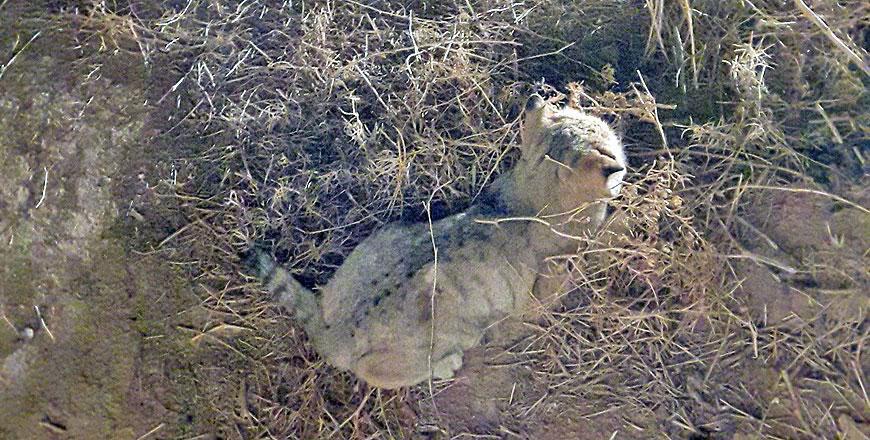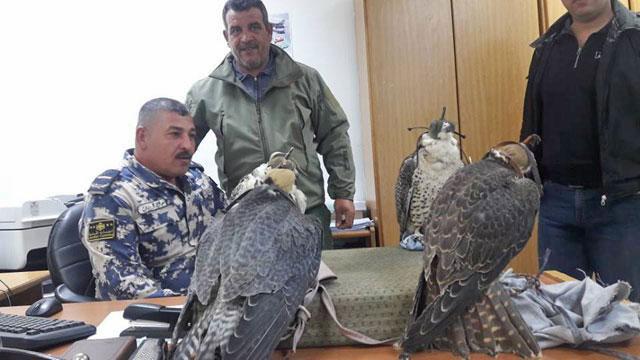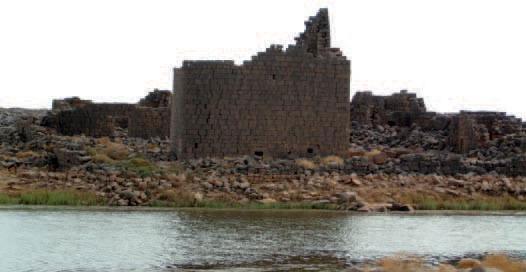You are here
Gov’t approves establishment of Burqu, Dahek nature reserves
By Hana Namrouqa - Dec 19,2018 - Last updated at Dec 19,2018

The sand cat’s sighting in Burqu is the fourth since the 1960s (Photo courtesy of Royal Society for the Conservation of Nature)
AMMAN — The government has approved Burqu and Dahek in Jordan’s eastern and northeastern desert as nature reserves, expanding the Kingdom’s network of nature sanctuaries to 11, according to conservationists.
The two new reserves contain unique ecosystems, which are not present in any of the country’s existing nature reserves, according to the Royal Society for the Conservation of Nature (RSCN). Burqu features a hamad or black basalt desert, while Dahek features a rare white sand desert.
The selection of both sites as nature reserves not only seeks to highlight their unique features, but also protect indigenous fauna and flora, the RSCN underscored.
The RSCN has already begun preliminary coordination with the ministries of environment and agriculture in preparation of establishing the nature reserves, according to RSCN Director Yehya Khaled. The director noted that next year, concentrated efforts for the establishment of both nature reserves will begin.
In the Cabinet decision, announced on Monday during a session headed by Prime Minister Omar Razzaz, the government approved the allocation of State Treasury lands for the establishment of both reserves, but under certain conditions, which banned the construction of buildings and facilities on the allocated lands, fencing the lands off and prohibiting grazing in both areas.
Khaled highlighted that the society tries to minimise its intervention in sites declared nature reserves, highlighting that when construction of “light structures” on sites is necessary, the RSCN seeks the approval of the government.
“The RSCN avoids sensitivities with local communities which can be created because of different factors, such as fencing off a nature reserve. The society, across all of its nature reserves, recognises local communities as partners in sustainable development,” Khaled told The Jordan Times on Wednesday.
Burqu Nature Reserve is expected to create 150 jobs, while Dahek Nature Reserve is projected to create 70 new jobs, according to the Jordan News Agency, Petra.
Burqu is situated some 28km off the main road to Rweished, the outermost populated area in Jordan’s eastern desert. It serves as a refuge for migratory birds and represents one of the Kingdom’s last oases, hosting a freshwater lake which serves animal life and nearby residents alike.
Khaled noted that a visitor’s centre, sustainable development projects and income-generating ventures have already been implemented to support the local community.
Burqu hosts unique plant and animal species, according to the RSCN, which said that species in Burqu have unique characteristics and endurance capacities, adapted from the rough environment of the area.
Dahek, or the so-called white desert is located in the north-eastern part of the country. Already a hiking, camping and adventure tourism destination, though unofficial, Dahek is an important bird area and described by adventure tourists as “one of world’s wonderful white deserts”.
Related Articles
AMMAN — The Royal Society for the Conservation of Nature (RSCN) has submitted the nomination of Burqu as a nature reserve to the Ministry of
AMMAN — Jordan is poised to host its first falconry training centre at the newly-designated Burqu Nature Reserve in the Kingdom’s eastern de
AMMAN — The Royal Society for the Conservation of Nature (RSCN) and the Public Security Directorate (PSD) on Thursday signed an agreement to

















